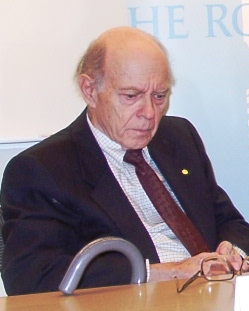Irwin Rose facts for kids
Quick facts for kids
Irwin Rose
|
|
|---|---|

Irwin Rose, c. 2000
|
|
| Born |
Irwin Allan Rose
July 16, 1926 Brooklyn, New York, U.S.
|
| Died | June 2, 2015 (aged 88) Deerfield, Massachusetts, U.S.
|
| Alma mater | University of Chicago (BS, PhD) NYU (postdoc) |
| Known for | Ubiquitin-mediated protein degradation |
| Spouse(s) | Zelda Budenstein |
| Children | 4 |
| Awards | Nobel Prize in Chemistry (2004) |
| Scientific career | |
| Fields | Biology |
| Institutions |
|
Irwin Allan Rose (born July 16, 1926 – died June 2, 2015) was an American biologist. Biologists are scientists who study living things. He won the 2004 Nobel Prize in Chemistry along with Aaron Ciechanover and Avram Hershko. They won for discovering how cells break down unwanted proteins. This process is called ubiquitin-mediated protein degradation.
Contents
Early Life and Education
Irwin Rose was born in Brooklyn, New York. His family was Jewish, and his father owned a flooring store. After high school, he went to Washington State University for a year. Then, he served in the Navy during World War II.
When he came back from the war, he continued his studies. He earned his first degree, a Bachelor of Science, in 1948. He then got his PhD in biochemistry in 1952. Both degrees were from the University of Chicago. After that, he did more research at NYU.
Career and Discoveries
Irwin Rose worked at the Yale School of Medicine from 1954 to 1963. He was part of the biochemistry department there. In 1963, he moved to the Fox Chase Cancer Center. He stayed there until he retired in 1995.
During the 1970s, he also taught at the University of Pennsylvania. He was a professor of physical biochemistry. In 2004, when he won the Nobel Prize, he was a professor at the University of California, Irvine School of Medicine.
While at the Fox Chase Cancer Center, Irwin Rose trained many other scientists. Some of these scientists helped him with his important discoveries. They studied how cells get rid of proteins they don't need anymore. This process is like a recycling system for cells.
The Nobel Prize Discovery
Irwin Rose, along with Aaron Ciechanover and Avram Hershko, discovered how cells use a small protein called ubiquitin. Ubiquitin acts like a tag. It marks proteins that are old, damaged, or no longer needed. Once a protein is tagged with ubiquitin, the cell knows to break it down.
This discovery was very important. It helped scientists understand how cells control many processes. For example, it helps cells grow, divide, and stay healthy. When this system doesn't work right, it can lead to diseases like cancer or Parkinson's disease. Their work opened up new ways to study and treat these illnesses.
Personal Life
Irwin Rose was married to Zelda Budenstein. They had four children together. He passed away on June 2, 2015, in Deerfield, Massachusetts. His wife, Zelda, passed away the following year in 2016.
See also
 In Spanish: Irwin Rose para niños
In Spanish: Irwin Rose para niños
 | Emma Amos |
 | Edward Mitchell Bannister |
 | Larry D. Alexander |
 | Ernie Barnes |

